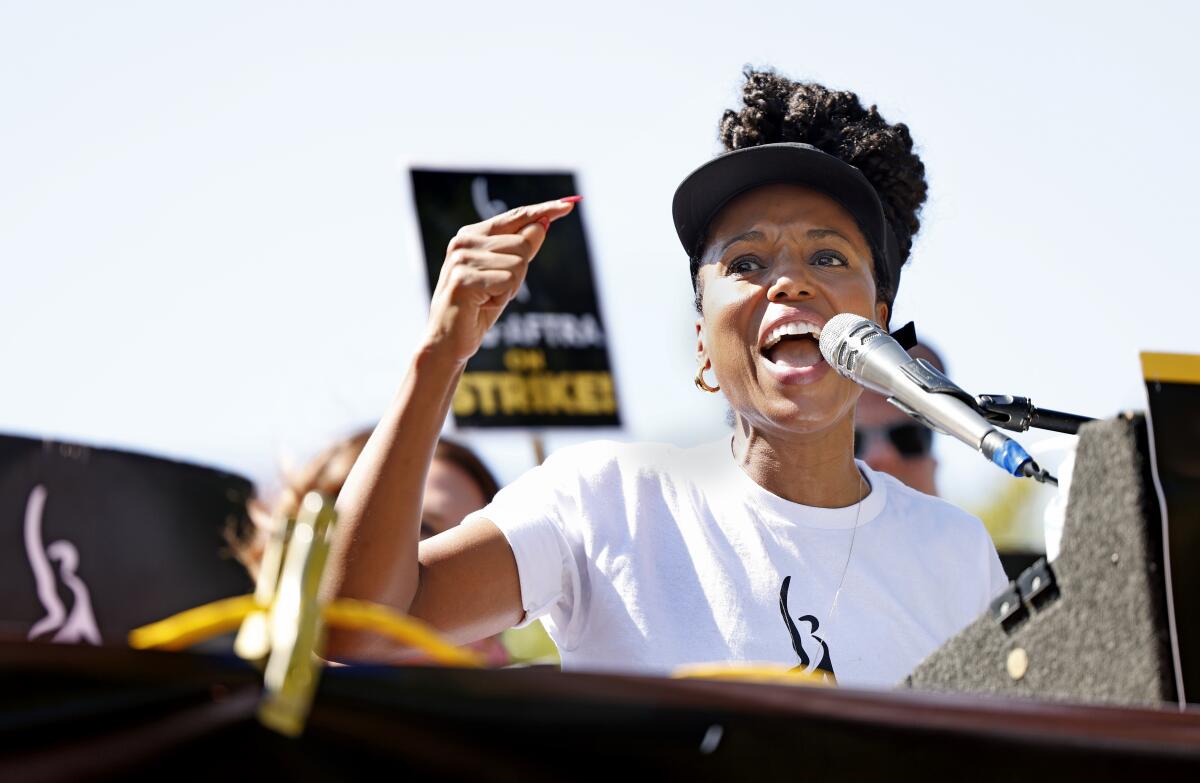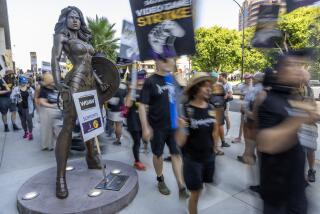Hollywood unions (and stars) rally near Disney amid strikes. ‘They underestimated our resolve’

More than 3,000 union members gathered near Walt Disney Co.’s Burbank headquarters in support of striking Hollywood actors — buoyed by impassioned speeches from Olivia Pope, President Jed Bartlet and Hellboy.
Kerry Washington (“Scandal”), Martin Sheen (“The West Wing”) and Ron Perlman (“Sons of Anarchy” and “Hellboy”) were among those who appeared on a makeshift stage on the back of a flatbed truck Tuesday to rally union members across Los Angeles’ labor landscape.
The event marked the 40th day of a strike by members of the performers’ union SAG-AFTRA against the major media companies, and members of the Writers Guild of America were also out in force — on the 113th day of their walkout.
“Not only do we have solidarity within our unions, we have solidarity between our unions, because we know that workers are workers and we work hard,” said Washington, best known for playing Washington, D.C., fixer Pope on Shonda Rhimes’ ABC hit.
“We don’t give up. We make sure that we look out for one another. We have the potential to transform this industry, and we have the potential to save so many other workers.”
The twin labor actions have brought production of film and television to a virtual halt.
In addition to Hollywood unions, Tuesday’s National Day of Solidarity event drew members of other labor groups, including the Los Angeles County Federation of Labor, the International Alliance of Theatrical Stage Employees, AFL-CIO, the Teamsters, the Laborers’ International Union of North America (LiUNA) and the Directors Guild of America.
But it was SAG-AFTRA that brought out the A-listers. Sheen summoned the spirit of his “West Wing” character (he played the president of the U.S. on the series), telling the crowd an Irish tale of a man who arrived in heaven, only to encounter St. Peter, who asked to see his scars.
The man said he had no scars.
“And St. Peter says: ‘What a pity. Was there nothing worth fighting for?’ ” Sheen said. “Clearly, this union has found something worth fighting for, and it is very costly.”
The strikes have shaken the Los Angeles economy with estimates of the toll to the region at as much as $3 billion. Most production workers have found themselves idled, and small businesses that depend on the largesse of the film and TV studios have struggled to make it through a summer of strikes.
There is still no end in sight. The studios and actors are far apart on issues, including higher pay for streaming shows and protections related to artificial intelligence.
Talks recently resumed between the WGA and the media companies’ negotiating arm, the Alliance of Motion Picture and Television Producers, in what many hope will lead to a resolution of the bitter work stoppage.
The two sides are expected to continue to meet this week, according to people close to the negotiations but not authorized to comment. The actors guild and the AMPTP haven’t spoken since negotiations broke down July 12 with the expiration of the union’s last three-year contract.
The streaming revolution has dramatically transformed the industry’s business model, and writers and actors have said it has become increasingly difficult to earn a living wage due to fewer residuals, shorter television seasons and smaller writing rooms that employ fewer people.
Both guilds are also alarmed by the rise of artificial intelligence, which many fear will replace human workers. Those concerns resonated throughout Tuesday’s rally.
The companies have responded to guilds by pointing to the fact that they are losing billions of dollars trying to transition their businesses from linear TV networks to streaming services. They say they need to hold the line on expenses but have offered compromises on some of the issues dear to the writers.
Strikers on the picket lines Tuesday showed little sympathy for the media giants, saying they suffer from self-inflicted wounds exacerbated by mergers and acquisitions that pushed companies such as Disney, Warner Bros. Discovery and Paramount Global deep into debt.
“We’re tired of these producers going to Wall Street and crowing about their extraordinary profits to justify their obscene personal financial rewards,” “West Wing” actor Bradley Whitford told the crowd. “And then turning to us — the people who create the value of their entire lives — and telling us that this business just don’t work anymore.”
The actors have demanded better residuals and a share of streaming company revenue from successful shows. The writers have demanded minimum staffing of writers’ rooms in order to make sure the scribes have opportunities to work.
“I don’t think there’s anybody here that wants a golden parachute... or wants stock options, or wants to buy one company and then fire 15,000 people so the two companies with less workers looks better on the bottom line,” said Perlman. “All we want to do is tell stories about human beings.”
Sheen said he’s been a union member, with the Screen Actors Guild and the American Federation of Television and Radio Artists, which merged in 2012, since 1961. He encouraged the flock to stand together as the hot labor summer melts into the fall.
“We are now called to support the union, support the leadership and stand together for the long haul,” Sheen said. “Stick to it like a stamp.”
Labor leaders said they were encouraged that AMPTP had invited the writers back to the negotiations after more than three months of inaction.
“I hope the companies, the executives over there are paying attention,” Duncan Crabtree-Ireland, SAG-AFTRA’s chief negotiator, told The Times, motioning to the russet-colored walls of Disney’s global headquarters.
“They underestimated our resolve at the bargaining table, and they should not underestimate our resolve in this strike,” Crabtree-Ireland said. “We are going to be out here as many days as it takes to get a fair deal.”
More to Read
Inside the business of entertainment
The Wide Shot brings you news, analysis and insights on everything from streaming wars to production — and what it all means for the future.
You may occasionally receive promotional content from the Los Angeles Times.











